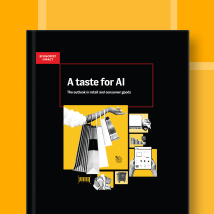Product descriptions:
From unpredictable crop yields to the rising costs of raw materials, climate change has disrupted supply chains, leading to product shortages and quality issues. For companies like Barilla, the largest pasta producer in the world with 300+ different food products made in over 90 factories and distributed across 100+ countries, the need to adopt a more sustainable and resilient supply chain strategy was critical to mitigate these risks and protect operating margins. However, their legacy on-premises data warehouse was ill-equipped to scale their operations effectively, creating silos that impacted their ability to navigate a growing list of external threats to their operations. Moving to the Databricks Data Intelligence Platform introduced a centralized architecture for data management and analytics, helping them deliver insights that improve all aspects of their business — from boosting manufacturing performance at lower costs, to streamlining logistics to improving sustainability, to delivering more targeted marketing campaigns.
Legacy data warehouse: a roadblock to supply chain success
Barilla has long been at the forefront of technology innovations in an effort to deliver the best food products to the masses. They share this responsibility with a diverse ecosystem of production sites, raw material vendors, distribution centers, and thousands of retailers serving markets from Asia to Europe and into the Americas. To feed this network with the best possible products, Barilla’s supply chain and logistics needed to maintain the highest standards of quality for their products, while maximizing revenue in a low-margin business. Historically, Barilla had been more of a people-driven company which served them well, but as their distribution expanded to support the growing demand for their products worldwide, it became clear they needed to modernize their data to allow analytics at scale.
With over 1TB of data (e.g., manufacturing logs, sensor data, ESG reports, logistics, inventory, financial metrics, marketing media spend) ingested daily, discovery of the right data for proper decision-making was compromised. Data analysts struggled to integrate and analyze the data needed, leading to delays and inefficiencies in delivering value to the business. Additionally, Barilla’s large footprint in Europe required processing sensitive consumer data for GDPR compliance. It was critical to have a solid data governance plan in place to ensure data quality and accuracy of insights for reporting.
“Prior to Databricks, business continuity and collaboration were incredibly challenging due to data being siloed in many different places,” said Lorenzo De Tomasi, Solutions Architect for AI and Data at Barilla. “Our previous technology stack consisted of monolithic components and data splintered across the organization with no unified data platform.” They understood from the start their existing data infrastructure needed an upgrade.
Transforming supply chain operations through Databricks
Barilla’s data strategy became rooted in Databricks. Upgrading their monolithic, mainframe-based infrastructure to Azure Databricks and Power BI for departmental reporting and dashboarding helped propel Barilla’s data-driven transition. Ninety percent of Barilla’s business from finance, R&D, manufacturing, supply chain and marketing now run on the Databricks Data Intelligence Platform. “Moving to Databricks was a game changer for us. We use all the key Databricks technologies including Delta Lake to create a centralized global repository; Unity Catalog to easily discover, understand and use data more securely through catalogs of data assets that are discoverable through shared tables and views; Databricks SQL to help analysts run BI workloads at scale; and MLflow to operationalize machine learning models,” said Lorenzo. “Using Databricks has helped our data teams work together toward delivering on our goals and has allowed Barilla to excel not only as a flagship of Italian tradition, but also as a flagship of innovation.”
Barilla uses Databricks for their entire ML practice, delivering intelligence that guides manufacturing, improves operations and drives their environmental sustainability efforts. With manufacturing cost deployment models, staff can extract and allocate industrial costs and quantify plant losses. They can also better predict when a machine is likely to fail and schedule maintenance windows proactively. By minimizing unplanned downtime, they have been able to reduce operating costs with less energy and lower emissions associated with running equipment.
To streamline supply chain management, Barilla has implemented a traceability system using Databricks. By analyzing supplier performance through BI dashboards, they are able to stack rank suppliers by product quality and on-time delivery to assess supplier risk. “Our data teams can now easily monitor shipments overseas in near real-time, predict demand and adjust production to improve inventory management,” expressed Lorenzo.
Barilla’s marketing teams use the Databricks Data Intelligence Platform to understand customer behavior and preferences to identify new markets and segment customers to drive more revenue opportunities. ROI tracking of marketing spend with an analytics dashboard reveals sales output on investments made via different channels.
Driving efficiency and sustainability in supply chain management
After transitioning to the Databricks Data Intelligence Platform, Barilla has seen a dramatic shift to data-informed decisions and an immediate improvement in operational efficiency. Barilla uses Databricks end-to-end supporting the decision-making of over 2,000 data users across the company delivering business continuity like never before. “Databricks has helped Barilla solve business challenges across a range of departments, saving millions of euros in production costs. With the lakehouse architecture, we now have a centralized enterprise data platform for all management, integration and analysis. This gives our teams the data they need to create value for the company,” said Graziano Belmonte, Global Big Data and Advanced Analytics Director at Barilla.
Looking ahead, Barilla has plans for continued innovations across their organization using data, analytics and AI. Data teams plan to extract insights from unstructured data, such as customer reviews and social media posts, to segment customers and personalize marketing efforts. Manufacturing is exploring anomaly detection and root cause analysis to identify and address unusual patterns and behaviors in manufacturing processes. Additionally, sales plans to use data insights to forecast demand and adjust production accordingly.
With a modern data lakehouse in place, Barilla is excited about their business and delivering the highest quality products to their growing market. “Databricks provides Barilla’s entire data team with the means to quickly process and analyze terabytes of business data. This has cleared a path toward an operating model that is collaborative, highly efficient and environmentally sustainable,” concludes Graziano.

